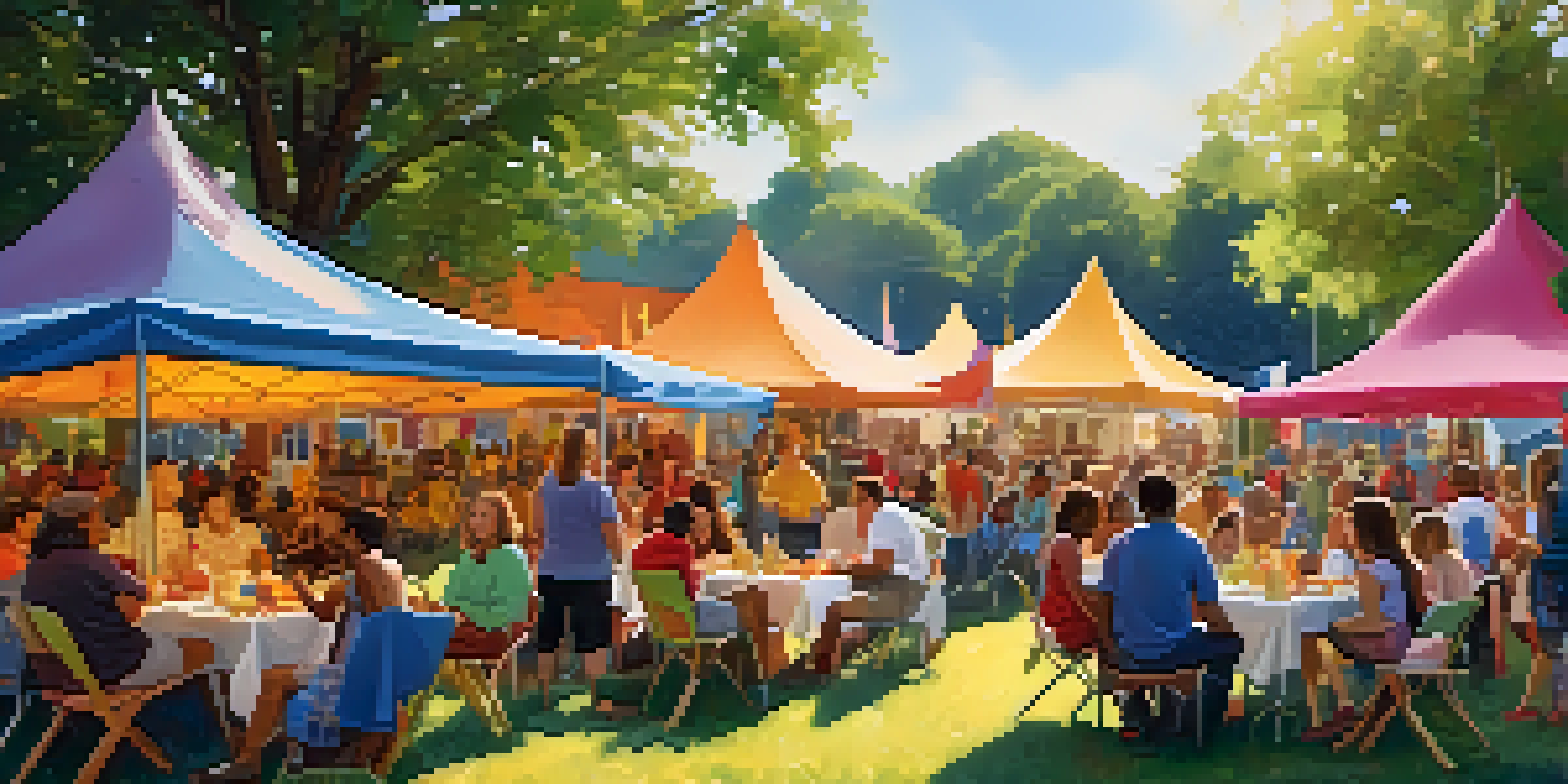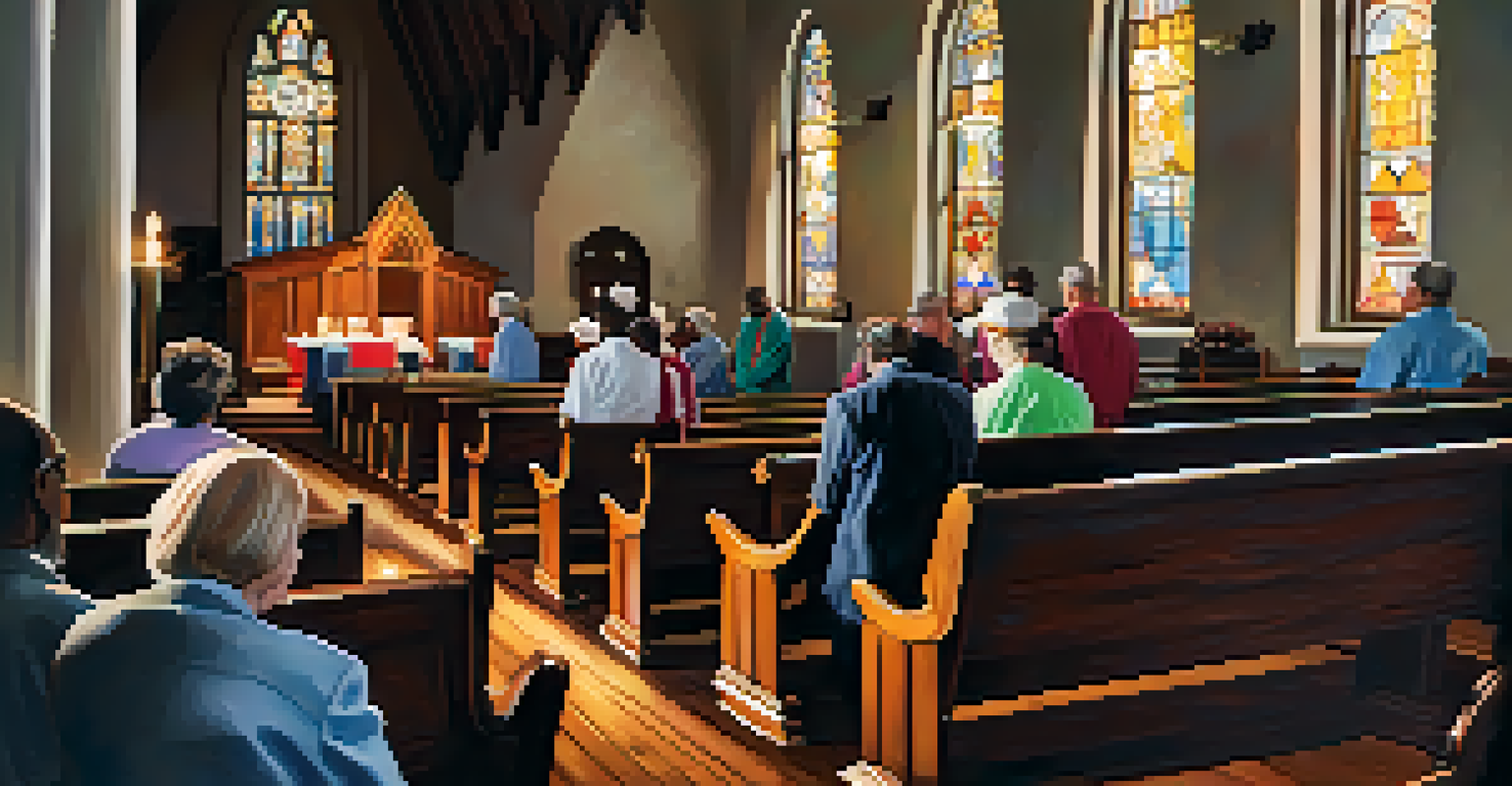The Role of Religion in Shaping Tennessee's Culture

Historical Roots of Religion in Tennessee
Tennessee's religious landscape is deeply intertwined with its history, dating back to the arrival of European settlers. Many of these early settlers brought their faith traditions, including various Christian denominations, which laid the groundwork for the state's spiritual identity. The establishment of towns often revolved around places of worship, making religion a central part of community life.
Religion is not a thing of the past; it is a living force that shapes our communities and our lives.
The Great Awakening in the 18th century further fueled religious fervor, leading to the rise of evangelical movements. This period saw an explosion of new denominations emerging, which contributed to Tennessee's reputation as the 'Volunteer State.' The impact of these movements is still felt today, as many Tennessee residents identify strongly with their faith communities.
Understanding the historical roots of religion in Tennessee provides a context for its ongoing significance. The evolution of these faith traditions has shaped not just individual beliefs, but also the collective values that permeate the state's culture.
Diversity of Faiths in Tennessee
While Tennessee is often associated with Christianity, the state's religious fabric is quite diverse. In addition to numerous Christian denominations, there are growing populations of Jews, Muslims, and adherents of other faiths. This diversity enriches the cultural landscape, fostering dialogue and understanding among different communities.

For example, cities like Nashville and Memphis are home to vibrant interfaith initiatives that promote cooperation and respect among various religious groups. These gatherings encourage shared values, such as compassion and service, which resonate across different faith traditions. It's a testament to how diversity can strengthen community ties rather than divide them.
Religious Roots Shape Tennessee Culture
Tennessee's historical roots in religion have significantly influenced its cultural identity and community values.
Thus, the richness of religious diversity in Tennessee not only reflects the state’s historical roots but also emphasizes its commitment to inclusivity. As the population continues to evolve, this mosaic of beliefs will likely play a crucial role in shaping future cultural expressions.
Religion's Influence on Arts and Music
Tennessee is renowned for its music scene, and religion has played a pivotal role in shaping its artistic expressions. From the soulful sounds of gospel music to the heartfelt lyrics of country songs, faith often serves as a source of inspiration for artists. Many musicians draw upon their religious experiences, weaving themes of love, redemption, and community into their work.
Music can change the world because it can change people.
Gospel music, in particular, has roots deeply embedded in African American religious traditions. This genre not only provides spiritual uplift but also serves as a means of storytelling, connecting listeners to their heritage and experiences. Festivals and events celebrating gospel music are commonplace, showcasing the profound impact of faith on regional culture.
As we delve into Tennessee's rich musical heritage, it's clear that religion is more than just a backdrop; it is a driving force that shapes artistic identity. The interplay between faith and creativity continues to resonate, influencing new generations of artists and musicians.
Community and Social Services Driven by Faith
Religious institutions in Tennessee are often at the forefront of community service and social support. Churches, synagogues, and mosques frequently organize outreach programs aimed at addressing local needs, such as food drives and shelters for the homeless. These acts of service are rooted in the core values of many faith traditions, which emphasize compassion and helping those in need.
For instance, during times of crisis, such as natural disasters, faith communities come together to provide relief and support. Organizations like the Tennessee Baptist Disaster Relief have mobilized volunteers to assist affected areas, demonstrating the powerful role of religion in fostering community resilience. This spirit of service creates a safety net that strengthens the social fabric of the state.
Diversity Enriches Faith Communities
The growing diversity of faiths in Tennessee fosters dialogue and strengthens community ties among different religious groups.
The commitment to social service highlights how religion in Tennessee transcends mere belief; it manifests in tangible actions that uplift the community. By prioritizing social responsibility, religious organizations contribute significantly to the cultural ethos of care and compassion.
Education and Religion in Tennessee
Education in Tennessee is notably influenced by religious beliefs, with many private and parochial schools founded on specific faith principles. These institutions typically aim to provide not only academic instruction but also moral and spiritual education, fostering a holistic approach to learning. Parents often choose these schools to ensure their children receive an education that aligns with their values.
Moreover, public schools in Tennessee also reflect religious values, often incorporating elements of character education inspired by various faith traditions. This intersection of education and religion can be a topic of debate, particularly regarding the teaching of evolution versus creationism in science classes. Such discussions illustrate the ongoing dialogue around the role of faith in public education.
Ultimately, the influence of religion on education in Tennessee is a complex tapestry that shapes how knowledge and values are imparted. This dynamic relationship between faith and learning continues to evolve, impacting the next generation's worldview.
Political Landscape Shaped by Religious Beliefs
Religion plays a significant role in shaping Tennessee's political landscape, influencing voters' values and priorities. Many residents view their faith as a guiding force in political decision-making, leading to a strong alignment of religious and political identities. This close relationship is often evident in regional issues such as education policy, healthcare, and social justice.
For instance, the evangelical community in Tennessee has been particularly active in advocating for policies that reflect their beliefs, such as pro-life initiatives and educational reforms. This engagement underscores how deeply intertwined religion and politics can be, with faith communities often mobilizing to support candidates and causes that align with their values.
Faith Drives Community and Service
Religious institutions in Tennessee play a crucial role in community service, actively addressing local needs and supporting those in crisis.
As we examine Tennessee's political dynamics, it's clear that religious beliefs are not merely personal; they are collective forces that shape community priorities. This intersection of faith and politics continues to influence the state's direction and policies.
Religion and Tennessee's Festivals and Traditions
Festivals and traditions in Tennessee often have religious roots, celebrating the cultural intersections of faith and community. Events such as the National Gospel Quartet Convention and local church picnics draw people together, intertwining music, food, and fellowship. These gatherings foster a sense of belonging and reinforce shared values within communities.
Additionally, various religious holidays are celebrated with unique local traditions, such as Christmas light displays or Easter egg hunts organized by churches. These events not only mark significant religious occasions but also bring communities together to celebrate, creating lasting memories and reinforcing bonds among residents.

Through these festivals and traditions, the role of religion in Tennessee becomes even more evident. It acts as a unifying force, bringing individuals together to celebrate their shared beliefs and values while also inviting others to join in the festivities.